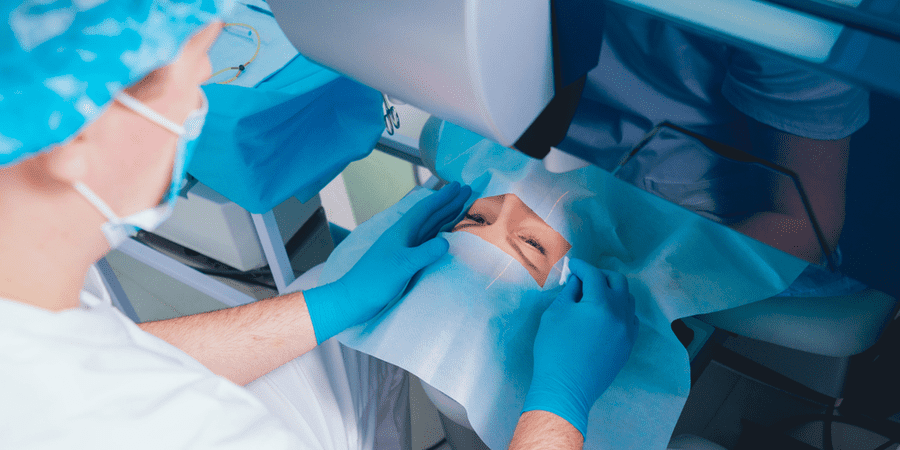



LASIK vs. SMILE in Hong Kong: Comparison, Where to Go & Costs
5th November 2025


Tired of wearing glasses or contact lenses? If you are considering receiving a laser eye surgery such as LASIK or SMILE to correct your vision, here is a complete guide covering all you need to know before deciding which one to choose. From procedures, precautions, recovery time, risks to costs, find out what your options are in Hong Kong.
What is LASIK?
First approved for surgical use in 1998, LASIK or laser-assisted in situ keratomileusis is a type of eye surgery using laser to correct refractive errors. When you have a refractive error, your eyes cannot refract and focus light onto the retina properly, forming blurred images consequently. This can happen when the cornea, the clear outermost surface of the eye which enables light to bend and focus on the retina, is not in the right shape. LASIK reshapes the cornea by polishing it with a laser to improve vision.
What is SMILE?
SMILE, as known as Small Incision Lenticule Extraction procedure, reshapes cornea and corrects vision in a minimally invasive way. It is an innovative technology approved for widespread use in the US in 2016. SMILE utilizes the Carl Zeiss VisuMax femtosecond laser system to alter the shape of the cornea to achieve vision correction.
Common reasons to consider LASIK or SMILE
People usually consider laser eye surgery when they have the following problems related to eyesight:
- Myopia (short-sightedness): not being able to see distant objects clearly
- Up to -15.00D for LASIK
- Up to -10.00D for SMILE
- Astigmatism: seeing blurry images due to irregular curve of the lens or the cornea
- Up to -6.00D for LASIK
- Up to -5.00D for SMILE
LASIK can be performed to correct up to +6.00D of hyperopia (long-sightedness), which refers to the eye condition of not being able to see nearby objects clearly; SMILE is inapplicable to correct hyperopia.
Moreover, both LASIK and SMILE cannot reverse presbyopia. It is an age-related eye condition when people naturally lose near focusing power as the lens becomes less elastic, so they find it difficult to see close objects or read.
Am I a suitable candidate for the surgery?
LASIK and SMILE may not be the right choice for everyone. Your ophthalmologist will ask you questions and thoroughly evaluate whether you are a suitable candidate for eye surgery. It is best if you:
-
have no active eye disease/condition, such as cataracts, glaucoma, large pupils and dry eyes, because they can worsen the condition or cause more side effects.
-
have the same eyeglass prescription for at least one year, because your vision has to be stable.
-
are over 18 years old because nearsightedness is likely to be changing throughout adolescence. The ideal age is over 21 years old. There is no upper age limit for LASIK.
-
are not pregnant or nursing as there may be fluctuation of your vision.
-
do not have keratoconus, which causes continuous thinning of the cornea and deterioration of the vision.
-
do not have severe refractive error, so your vision can be corrected to at least 20/40.
-
do not have uncontrolled autoimmune or connective tissue disease, e.g. lupus and rheumatoid arthritis.
On the other hand, SMILE may be a better option for you if you:
-
have an active lifestyle or job, as accidental displacement of the flap created in LASIK surgery is possible upon vigorous activities; contrarily SMILE does not involve the creation of a flap.
-
have thin corneas.
Procedures
LASIK is a pain-free procedure. It can usually be completed within 20 minutes, depending on the prescription and the degree of correction.
In LASIK surgery:
- You will be given drops of topical anesthetic to numb the eye to prevent discomfort.
- Your eye surgeon creates a small, thin, circular flap in your cornea by using lasers or a mechanical tool.
- The flap is then lifted and folded back. A laser is used to remove some of the corneal tissues precisely to modify the shape of the cornea and change its focusing power.
- After that, the flap is repositioned to cover the corneal tissues. No stitches or bandages are needed and the cornea will heal within a few days.
On the contrary, SMILE does not involve the creation of a cornea flap and the procedure generally takes about 5 minutes.
In SMILE surgery:
- You will be given drops of topical anesthetic to numb the eye to prevent discomfort.
- Your eye surgeon creates a thin lenticule (precise lens-shaped disc) inside the cornea with a laser.
- The lenticule is removed through a 2-4mm incision generated by laser. The small incision will heal on its own.
Recovery and outcome
Vision improvement is immediate for LASIK patients but may take slightly longer for SMILE. You will be able to see more clearly continuously after surgery and go back to normal activities in one to two days. However, recovery time may vary among individuals and full visual recovery may take 3-6 months.
The effect of both surgeries is permanent in most cases. It is important to note that LASIK does not guarantee a perfect vision. More than 90% of LASIK patients achieve a 20/20 to 20/40 vision without glasses or contact lenses. As for SMILE, 99% of people have 20/40 vision at their follow-up appointment after 6 months, and 88% have a 20/20 vision.
Nevertheless, there is a possibility that you still have to wear glasses or contact lenses after the surgery as you age.
Possible risks and side effects
Some of the following side effects usually disappear in 3 to 6 months following the surgery for most people. However, some may appear occasionally.
-
Discomfort: some people may experience a burning sensation in eyes that may last for a few hours after the surgery. It is normal for the eyes to feel irritated after the surgery, especially for LASIK.
-
Dry eyes: LASIK reduces tear production temporarily, especially within the first month following the surgery. The problem should be less common with SMILE as its disturbance of the corneal nerves is minimal.
-
Visual changes or disturbances: e.g. hazy or blurred vision, difficulty seeing at night, seeing glares, halos or starbursts around lights, becoming sensitive to light, general pain and discomfort, etc.
-
Undercorrection or overcorrection: Removing too little or too much tissues can lead to unsatisfactory vision improvement. A second treatment called retreatment or enhancement may be needed.
-
Eye infection: The step of creating a flap makes LASIK particularly risky. Flap complication rate is as low as less than 1%, but it can cause infections or excessive tears being produced. A much smaller incision in SMILE, on the other hand, greatly lowers the risk of infections.
-
Vision loss: It is an extremely rare result of surgical complications with less than 1% of occurence.
How Alea can help you save on insurance
Points to note
It is important that you understand the do’s and don'ts to ensure a satisfactory result.
Before the surgery
- Fully understand the risks and complications.
- Stop wearing contact lenses and switch to eyeglasses for at least 2 weeks before an eye check-up and your surgery. The duration may be longer for different types of contact lenses.
- Do not apply eye makeup on the day before and the day after your surgery.
After the surgery
- Do not drive or operate machinery.
- Do not rub or press on the eye(s) as this may affect the healing of the flap.
- Keep the eye shield on until the next day. You can wipe off excessive tears using a clean tissue or towel.
- You may be able to resume work and social activities the next day but a few days of rest is recommended.
Postoperative care
- Follow your doctor’s instructions to take medication or apply eye drops.
- Attend follow-up appointments with your doctor the next day. It will also be scheduled at 1 week, 1 month, 3 months and 6 months after the surgery.
- Avoid soap, tap water or contaminated water getting in contact with your eyes for 1 week.
- Do not apply eye makeup for 14 days.
- Do not go for a swim or do a facial for 1 month, steam sauna for 3 months.
- Put on sunglasses when going out for 1 month to avoid sunlight irritation.
- Do not take part in contact sports for at least 6 months.
Cost of LASIK and SMILE in Hong Kong
LASIK and SMILE are only provided by the private health sector in Hong Kong. The cost varies upon doctor fees, operation room fees and hospital charges. Find more details below:
| Private hospitals | Pre-operative examination fees | SMILE (both eyes) | LASIK (both eyes) | Remarks |
|---|---|---|---|---|
| St. Teresa’s Hospital | HK$ 800 | - | HK$ 19,800 | 5 post-operative examinations included |
| St. Paul’s Hospital | HK$ 800 | - | HK$ 21,000 | 5 post-operative examinations included |
| HKSH Guy Hugh Chan Refractive Surgery Centre | HK$ 990 | HK$ 22,000 | HK$ 22,000 | 5 post-operative examinations included |
| Private clinics/ eye centers | Pre-operative examination fees | SMILE (both eyes) | LASIK (both eyes) | Remarks |
|---|---|---|---|---|
| CMER SMILE Laser Center | HK$ 100 | HK$ 29,000 | HK$ 22,000 | Pre-operative examination, medication for the day of correction, 5 post-operative examinations, enhancement within 2 years and refractive examination within 1 year included |
| Clarity SMILE LASIK Centre | HK$ 100 (SMILE) HK$ 500 (LASIK) | HK$ 27,800 | HK$ 19,800 | Pre-operative examination, 5 post-operative examinations, medications and enhancement within 1 year included |
| Hong Kong Laser Eye Centre | HK$ 100 | HK$ 29,800 | HK$ 21,000 | 5 post-operative examinations included |
| Hong Kong Nobel Eye Centre | - | HK$ 20,000 | HK$ 20,000 | 4 post-operative examinations included |
*All amounts are in HKD and were last updated in July 2024. No responsibility is accepted for any inaccuracies, errors, or omissions. It is always best to call ahead to make sure the information is still up-to-date.
Does insurance cover the costs of LASIK/SMILE surgery in Hong Kong?
Ophthalmology consultations are reimbursed under doctor specialist fees. Generally, high-end medical plans will reimburse ophthalmologist consultation and surgical fees in full without any sub-limit whereas local plans usually have surgical and doctor specialist limits. In regards to elective procedures such as corrective vision surgeries LASIK, PRK, SMILE, LASEK, they are rarely covered by insurance providers. We at Alea are currently working with one insurance provider that covers refractive eye surgery up to HK$6,500 (approx.) per year without any co-insurance or waiting period.
If you have questions regarding health insurance, talk to an expert at Alea.
Before planning an eye surgery, it is always advisable to consult your ophthalmologist to fully understand all the risks and complications. Please seek medical help as soon as possible if you experience any abnormalities after the surgery.
Looking for life or health insurance for yourself, your family or your team?
Do you already have an insurance policy? You could find a better plan!
Alea brings you choice, unbiased advice and outstanding service, with access to 100+ options from 25+ insurance companies. If you already have an insurance policy, switching insurance policies with Alea doesn’t cost you a thing.
Get free quotes with us today.
An advisor will be in touch to answer all your questions!
This article was independently written by Alea and is not sponsored. It is informative only and not intended to be a substitute for professional advice and should never be relied upon for specific advice.

